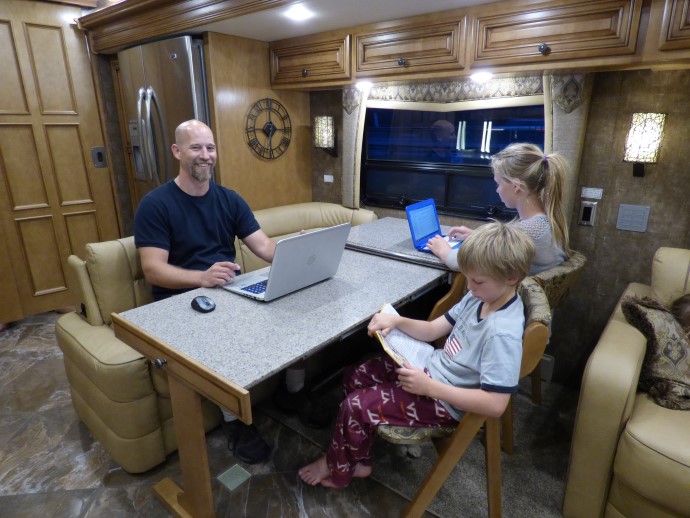We work while we travel full-time, so it’s critical that we stay connected wherever our travels take us. Dan works as a software engineer, so he needs a mobile office with a phone, email, and VPN. Susie is a travel writer and also blogs for TravelingMom. We also produce videos, write blogs and post daily updates on our website and on social media.

For us, staying connected means we need the following:
- Cell phone service
- Internet connection
- High bandwidth data connection
Table of Contents
Cellular service
Cell phone service is available nationwide with pretty good 4G LTE network coverage. We use cell phones and devices from multiple national carriers, which increases our odds of service coverage. This means our cell phones work in all but the most remote areas we visit. Occasionally, we make WiFi calls where cell service is not available.
Mobile Hotspot
A mobile hotspot is a wireless device that connects to the Internet through a cell service provider and can provide an Internet connection to up to 10 WiFi enabled devices, such as laptops and tablets. We use a Novatel MiFi Jetpack 4620L to connect our computers, laptops and iPads to the Internet. We also connect our cell phones to the JetPack when the cell signal isn’t as good. Keep in mind, however, that every connected device takes a slice of the bandwidth, which can reduce your Internet connection to a crawl if you don’t have a good signal.
Cell Signal Booster
A cell phone signal booster amplifies the signal from the cell tower, expanding the coverage area, even into dead zones. We use a Wineguard Connect 2.0 which uses an external antenna to boost the signal inside our RV. This amazing device has provided our cell phones with 3 bars of 4G LTE where without it we could only get a 2G signal. It also boosts the signal to our mobile hotspot, so we get better Internet connection speeds, which is especially important when multiple devices are connected.
Free WiFi Hotspots
There are free wifi hotspots all across the country. Coffee shops and laundromats almost always have free wifi, as do many fast food restaurants. Of course, you will need to make a purchase at a coffee shop or restaurant if you want to use their wifi, so it’s not really free, but still cheap. Many cities and towns also now offer free wifi in downtown areas or parks.
Many campgrounds, like KOA, offer free WiFi to campers and provide a good quality signal. Some campgrounds have limited coverage areas where the wifi signals don’t cover the entire campground, so be sure to ask before you reserve a site. Comcast Cable customers can also take advantage of XFINITY WiFi hotspots, which are popping up everywhere that Comcast offers broadband Internet access.
WiFi Range Extender
A WiFi range extender amplifies the WiFi signal from a WiFi hotspot and makes it easier to connect multiple devices to the WiFi network. You can use a WiFi range extender to expand the WiFi coverage area, so you can access free WiFi hotspots from within the comfort of your RV. Some luxury RVs, like the Newmar King Aire, come fully equipped with a range extender.



Send me some more info on pricing and more. Thank you, Scott